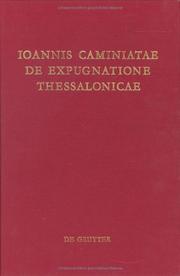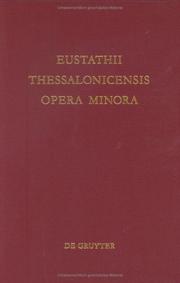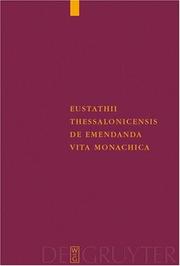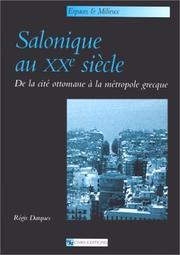| Listing 1 - 10 of 13 | << page >> |
Sort by
|
Book
ISBN: 1784916803 9781784916800 Year: 2017 Publisher: Summertown, Oxford
Abstract | Keywords | Export | Availability | Bookmark
 Loading...
Loading...Choose an application
- Reference Manager
- EndNote
- RefWorks (Direct export to RefWorks)

ISBN: 3110022869 9783110022865 9783110821543 3110821540 Year: 1973 Volume: volumen 4 Publisher: Berolini Novi Eboraci Apud Walter de Gruyter et Socios
Abstract | Keywords | Export | Availability | Bookmark
 Loading...
Loading...Choose an application
- Reference Manager
- EndNote
- RefWorks (Direct export to RefWorks)
Ioannis Caminiatae de Expugnatione Thessalonicae.
HISTORY / General. --- Thessalonikē (Greece) --- History. --- Belagerungstechnik. --- Araber. --- Saloniki --- Thessalonikē (Greece) --- Eroberung <904>. --- Thessalonique (Grèce) --- Histoire.
Book

ISBN: 9783110524918 3110524910 3110523205 9783110523201 9783110524901 3110524902 9783110522211 3110522217 Year: 2017 Publisher: Berlin Boston
Abstract | Keywords | Export | Availability | Bookmark
 Loading...
Loading...Choose an application
- Reference Manager
- EndNote
- RefWorks (Direct export to RefWorks)
Despite the relevance of Eustathios to both Classical and Byzantine studies, no monograph and no collective volume in English has yet been devoted to his figure. This book attempts to fill in this gap by addressing the various facets of his output - above all his commentaries on Homer, Dionysius the Periegete, Pindar, and the Iambic Canon on the Pentecost; but also his historiographical work, his speeches and his theological production receive due attention. The book also tackles several aspects of Eustathios' style (proverbs, allusions, etc.), and the meaning of his work in the context of his historical moment. Addressed at specialists but also at graduate students with an interest in the reception of Classical antiquity and in Byzantine civilisation, the volume gathers papers by leading scholars from various countries, and it opens up new paths of research in several areas of philology and history, above all by interweaving and juxtaposing Eustathios' dimension as an Homerist and an immensely learned classical scholar with his capacities as an orator, a highly praised teacher, a rhetorically refined writer of Greek prose, an historian of his own turbulent times, and an archbishop who had to fulfil his everyday duties.
Eustathius, --- Eustathe, --- Eustathios, --- Eustazio, --- Tessalonica, Eustazio di, --- Thessalonike, Eustathios von, --- Eustathius Thessalonicensis --- Eustathius Corinthus --- Eustathius --- Eustathios of Thessalonike --- Eustathios von Thessalonike --- Criticism and interpretation. --- E-books --- Byzantine history. --- Byzantine philology. --- Byzantinische Geschichte. --- Byzantinische Philologie. --- Eustathios of Thessalonike. --- Eustathios von Thessalonike. --- Homerforschung. --- Homeric scholarship. --- LITERARY CRITICISM / Ancient & Classical.
Book
ISBN: 9783598778513 3598778511 3110928183 9783110928181 9783111859378 3111859371 Year: 2006 Volume: 239 Publisher: München Saur
Abstract | Keywords | Export | Availability | Bookmark
 Loading...
Loading...Choose an application
- Reference Manager
- EndNote
- RefWorks (Direct export to RefWorks)
The volumes published in the series Beiträge zur Altertumskunde comprise monographs, collective volumes, editions, translations and commentaries on various topics from the fields of Greek and Latin Philology, Ancient History, Archeology, Ancient Philosophy as well as Classical Reception Studies. The series thus offers indispensable research tools for a wide range of disciplines related to Ancient Studies.
Eustathius, --- Authors, Byzantine. --- Byzantine authors --- Eustathe, --- Eustathios, --- Eustazio, --- Tessalonica, Eustazio di, --- Thessalonike, Eustathios von, --- Eustathius Thessalonicensis --- Eustathius Corinthus --- Eustathius --- Eustathios of Thessalonike --- Eustathios von Thessalonike --- Eustathius ep. Thessalonicensis --- Eustathius, - Archbishop of Thessalonica, - d. ca. 1194 - Correspondence --- Eustathius, - Archbishop of Thessalonica, - d. ca. 1194
Book
ISBN: 9781876503369 187650336X 9789004344907 900434490X Year: 2013 Publisher: Leiden
Abstract | Keywords | Export | Availability | Bookmark
 Loading...
Loading...Choose an application
- Reference Manager
- EndNote
- RefWorks (Direct export to RefWorks)
Byzantine literature --- Speeches, addresses, etc --- Greek literature, Byzantine --- Greek literature, Medieval and late --- Addresses --- Collected papers (Anthologies) --- Discourses --- Orations --- Papers, Collected (Anthologies) --- Greek literature --- Festschriften --- Lectures and lecturing --- Rhetoric, Medieval. --- Eustathius, --- Eustathe, --- Eustathios, --- Eustazio, --- Tessalonica, Eustazio di, --- Thessalonike, Eustathios von, --- Eustathius Thessalonicensis --- Eustathius Corinthus --- Eustathius --- Eustathios of Thessalonike --- Eustathios von Thessalonike
Book
ISBN: 9786613940940 128362849X 3110278553 3110278383 3110278561 Year: 2012 Publisher: Berlin ; Boston : De Gruyter,
Abstract | Keywords | Export | Availability | Bookmark
 Loading...
Loading...Choose an application
- Reference Manager
- EndNote
- RefWorks (Direct export to RefWorks)
Obwohl der Bestand an frühbyzantinischen Wand- und Gewölbemosaiken im östlichen Mittelmeerraum sehr gering ist, waren die umfangreichen Reste des erhaltenen musivischen Dekors der Acheiropoietos-Basilika in Thessaloniki bisher noch nicht Gegenstand einer umfassenden Untersuchung. Die vorliegende Studie stellt diese überwiegend in den Arkaden und Fensterlaibungen erhaltenen Mosaiken in den Mittelpunkt. Aufbauend an die ausführliche Analyse dieses qualitätvollen Dekors werden weiterführende Fragen zu den frühbyzantinischen Mosaiken von Thessaloniki (v. a. Hagios Demetrios, Gerogios-Rotunde) bearbeitet und die bisher stark umstrittene relative Chronologie dieser Kunstgattung in dieser Metropole auf eine neue Grundlage gestellt. Ein umfangreicher Katalog vergleichbarer dekorativer Mosaiken des 5. und 6. Jhs. in Bogenlaibungen von Monumenten des gesamten Mittelmerraums, die bisher noch nicht zusammenfassend bearbeitet worden sind, dient als Basis für die Bewertung und Einordnung. Als Corpus dekorativer Mosaiken in Bogenlaibungen des 5. und 6. Jhs. ist die Arbeit von grundlegender Bedeutung.
Mosaics, Byzantine --- Decoration and ornament, Byzantine --- Decoration and ornament, Architectural --- Christian art and symbolism --- Art, Christian --- Art, Ecclesiastical --- Arts in the church --- Christian symbolism --- Ecclesiastical art --- Symbolism and Christian art --- Religious art --- Symbolism --- Symbolism in art --- Church decoration and ornament --- Architectural decoration and ornament --- Architecture --- Stonework, Decorative --- Architectural design --- Exterior walls --- Byzantine decoration and ornament --- Byzantine mosaics --- Decoration and ornament --- Acheiropoiētos (Church : Thessalonikē, Greece) --- Thessalonikē (Greece). --- Thessalonikē (Greece) --- Thessalonike --- Salanik (Greece) --- Salonica (Greece) --- Salonicco (Greece) --- Salonika (Greece) --- Saloniki (Greece) --- Salonique (Greece) --- Sālūnīk (Greece) --- Selânik (Greece) --- Solonika (Turkey) --- Solun (Greece) --- Thessalonica (Greece) --- Thessaloníki (Greece) --- Thessalonique (Greece) --- Thesszaloniki (Greece) --- Θεσσαλονίκη (Greece) --- Selânik (Turkey) --- Antiquities. --- Buildings, structures, etc. --- Acheiropoietos-Basilica. --- Decorative Mosaics of the 5th to 7th Centuries. --- Ornamentation. --- Thessaloniki. --- Acheiropoietos (Church : Thessalonike, Greece) --- Thessalonike (Greece)

ISBN: 311014168X 3110812762 9783110812763 9783110141689 Year: 2000 Volume: 32 Publisher: Berolini : de Gruyter,
Abstract | Keywords | Export | Availability | Bookmark
 Loading...
Loading...Choose an application
- Reference Manager
- EndNote
- RefWorks (Direct export to RefWorks)
A critical edition of the minor works of Eustathios Thessalonicensis, Archbishop of Salonica (a city in the Byzantine Empire), 12th century theologian and renowned Greek scholar. Original Greek texts without translations. Kritische Edition von 18 z. T. unedierten Reden des Erzbischofs von Thessalonike, Theologe und bedeutender Gelehrter des 12. Jahrhunderts. Quellentexte in griechischer Sprache, nicht übersetzt. Eustathios von Thessalonike (12. Jh.) ist in den Reihen der Klassischen Philologen vor allem durch seine umfangreichen Kommentare zur Ilias und Odyssee bekannt. Daneben hat er Enkomien sowie zahlreiche Reden religiösen und allgemeinen Inhalts verfaßt, von denen bisher eine neuzeitliche kritische Edition fehlt.
Eustathius, --- Byzantine Empire --- History --- Eustathe, --- Eustathios, --- Eustazio, --- Tessalonica, Eustazio di, --- Thessalonike, Eustathios von, --- Byzantium (Empire) --- Vizantii︠a︡ --- Bajo Imperio --- Bizancjum --- Byzantinē Autokratoria --- Vyzantinon Kratos --- Vyzantinē Autokratoria --- Impero bizantino --- Bizantia --- Eustathius Thessalonicensis --- Eustathius Corinthus --- Eustathius --- Eustathios of Thessalonike --- Eustathios von Thessalonike --- Classical and Ancient Near Eastern Studies --- Theology and Religious Studies --- HISTORY / Ancient / General. --- Byzantine Studies. --- Historical Periods --- Old Testament and Ancient Near East --- History of Reception. --- Patristics --- Acts of Synods, Catenae and other Sources. --- Annals --- Auxiliary sciences of history

ISBN: 3110189046 9783110189049 9786611993092 3119161470 1441612416 1281993093 3110193744 9781441612410 9781281993090 6611993096 9783119161473 9783110193749 Year: 2006 Volume: 45 Publisher: De Gruyter
Abstract | Keywords | Export | Availability | Bookmark
 Loading...
Loading...Choose an application
- Reference Manager
- EndNote
- RefWorks (Direct export to RefWorks)
Ein wertvolles historisches Zeugnis und literarisches Werk von Rang stellt diese Schrift des Eustathios von Thessalonike (ca. 1115–1195) dar, in der der Erzbischof und berühmte Gelehrte drastisch und detailreich mit seinen Mönchen ins Gericht geht; in seinen Augen bleiben sie weit hinter dem Ideal zurück, das sie bei ihrer Mönchsweihe gelobten, besonders durch Geschäftemacherei und Bildungsfeindlichkeit. Mit Prolegomena, Edition und Indices erschließt der Band der byzantinistischen Fachwelt das 1832 auf unzureichender handschriftlicher Grundlage edierte Werk neu, auch den Quellenwert für die Liturgiegeschichte. Doch sollte ein Werk von diesem Rang und Reiz nicht den Spezialisten vorbehalten sein; der Band stellt deshalb dem griechischen Text eine deutsche Übersetzung gegenüber. Als Ergänzung zu dieser Edition erscheint in der Reihe "Supplementa Byzantina" eine kommentierende Monographie. Beide Bände sind auch zu einem gemeinsamen Setpreis erhältlich. In a detailed account, the archbishop and renowned scholar Eustathius of Thessalonica (probably 1115–1195) takes his monks severely to task, for in his eyes they fall far short of the ideals they professed in their monastic vows, particularly by engaging in business and being hostile to education and learning. With its Prolegomena, editorial work, and indexes, this new edition is a valuable source for Byzantinists. The volume also provides a German translation of the Greek text. In addition to this text, a commentary is published within the series "Supplementa Byzantina." Both volumes are available as a set .
Monastic and religious life --- Church renewal --- Orthodox Eastern Church --- Eustathius, --- Criticism and interpretation. --- Eustathius Corinthus --- Eustathius --- Eustathios of Thessalonike --- Eustathios von Thessalonike --- Christianity --- Church --- Church reform --- Reform of the church --- Renewal of the church --- Religious awakening --- Renewal --- Reform --- Eustathe, --- Eustathios, --- Eustazio, --- Tessalonica, Eustazio di, --- Thessalonike, Eustathios von, --- Eustathius Thessalonicensis --- Monastic and religious life - Early works to 1800 --- Church renewal - Orthodox Eastern Church - Early works to 1800 --- Monachisme grec --- Byzantine empire/religion. --- Eustathius of Thessalonica.

ISSN: 1269701X ISBN: 2271078636 2271056608 9782271056603 Year: 2002 Publisher: CNRS Éditions
Abstract | Keywords | Export | Availability | Bookmark
 Loading...
Loading...Choose an application
- Reference Manager
- EndNote
- RefWorks (Direct export to RefWorks)
Le 26 octobre 1912, après plus de quatre siècles de domination turque, Salonique redevient grecque. Une ère nouvelle s'ouvre avec la fin de la première guerre balkanique qui libère la ville pour la rendre à ses occupants premiers. Cet événement inaugure une série de transformations majeures. C'est le début d'une grande entreprise de ± colonisation intérieure?. Comment la cité ottomane cernée par ses antiques murailles a-t-elle progressivement évolué vers la métropole moderne d'envergure internationale que l'on connaît aujourd'hui, forte de son million d'administrés? De la ville à l'agglomération puis à la région urbaine finale, comment le double processus d'expansion et de restructuration s'est-il appliqué à l'espace urbain et à la population locale? La cité cosmopolite du début du siècle s'est effacée par étapes successives. La mosaïque de populations juive, slave, turque, valaque, albanaise, arménienne a été remplacée par un flot d'immigrants et de réfugiés hellènes issus d'horizons proches ou lointains, dans un va-et-vient incessant de mouvements migratoires contraires. L'exode rural et les retours migratoires d'Allemagne ont entraîné une densification des constructions, et une expansion périphérique remarquable. Pourtant, la refonte du bâti, les aménagements multiples et le déferlement de l'urbanisme ± néo-hellénique? n'ont pas fini d'effacer les traces de la capitale économique de la Turquie d'Europe, et d'en faire une ville sans histoire ou sans mémoire. Déclarée capitale culturelle de l'Europe en 1997, distante d'une quarantaine de kilomètres de la frontière slavo-macédonienne, Salonique s'établit en avant-poste européen face à une péninsule?
Thessalonikē (Greece) --- History --- Thessalonike --- Salanik (Greece) --- Salonica (Greece) --- Salonicco (Greece) --- Salonika (Greece) --- Saloniki (Greece) --- Salonique (Greece) --- Sālūnīk (Greece) --- Selânik (Greece) --- Solonika (Turkey) --- Solun (Greece) --- Thessalonica (Greece) --- Thessaloníki (Greece) --- Thessalonique (Greece) --- Thesszaloniki (Greece) --- Θεσσαλονίκη (Greece) --- Thessalonikē (Greece) --- Selânik (Turkey) --- Thessalonique (Grèce) --- Histoire --- Urbanization --- Greece. --- Cities and towns, Movement to --- Urban development --- Urban systems --- Cities and towns --- Social history --- Sociology, Rural --- Sociology, Urban --- Urban policy --- Rural-urban migration --- Empire ottoman --- Grèce moderne --- Salonique
Book
ISBN: 9780521877381 0521877385 9780511576720 9781107403888 9780511518072 0511518072 9780511517587 0511517580 1107198828 110740388X 1282104020 9786612104022 0511576722 0511515766 0511514530 0511517041 Year: 2009 Publisher: Cambridge Cambridge University Press
Abstract | Keywords | Export | Availability | Bookmark
 Loading...
Loading...Choose an application
- Reference Manager
- EndNote
- RefWorks (Direct export to RefWorks)
This is a detailed analysis of Byzantine political attitudes towards the Ottomans and western Europeans during the critical last century of Byzantium. The book covers three major regions of the Byzantine Empire - Thessalonike, Constantinople, and the Morea - where the political orientations of aristocrats, merchants, the urban populace, peasants, and members of ecclesiastical and monastic circles are examined against the background of social and economic conditions. Through its particular focus on the political and religious dispositions of individuals, families and social groups, the book offers an original view of late Byzantine politics and society that is not found in conventional narratives. Drawing on a wide range of Byzantine, western and Ottoman sources, it authoritatively illustrates how late Byzantium was drawn into an Ottoman system in spite of the westward-looking orientation of the majority of its ruling elite.
East and West. --- Orient et Occident --- Byzantine Empire --- Turkey --- Istanbul (Turkey) --- Thessalonike (Greece) --- Peloponnesus (Greece : Peninsula) --- Empire byzantin --- Empire ottoman --- Istanbul (Turquie) --- Thessalonique (Grèce) --- Péloponnèse (Grèce) --- Politics and government --- Social conditions. --- History --- Relations --- History. --- Politique et gouvernement --- Conditions sociales --- Histoire --- Political culture --- East and West --- Peloponnesus (Greece) --- Social conditions --- Thessalonikē (Greece) --- Thessalonikē (Greece) --- Thessalonique (Grèce) --- Péloponnèse (Grèce) --- Civilization, Western --- Civilization, Oriental --- Occident and Orient --- Orient and Occident --- West and East --- Eastern question --- Culture --- Political science --- Asian influences --- Oriental influences --- Western influences --- Byzantium (Empire) --- Vizantii︠a︡ --- Bajo Imperio --- Bizancjum --- Byzantinē Autokratoria --- Vyzantinon Kratos --- Vyzantinē Autokratoria --- Impero bizantino --- Bizantia --- Ottoman Empire --- Ottoman Empire, 1288-1918 --- Arts and Humanities --- Political culture - Byzantine Empire --- Byzantine Empire - Politics and government - 1081-1453 --- Byzantine Empire - Social conditions --- Turkey - History - Ottoman Empire, 1288-1918 --- Byzantine Empire - Relations - Turkey --- Byzantine Empire - Relations - Europe, Western --- Thessalonikē (Greece) - History --- Istanbul (Turkey) - History --- Peloponnesus (Greece) - History
| Listing 1 - 10 of 13 | << page >> |
Sort by
|

 Search
Search Feedback
Feedback About UniCat
About UniCat  Help
Help News
News